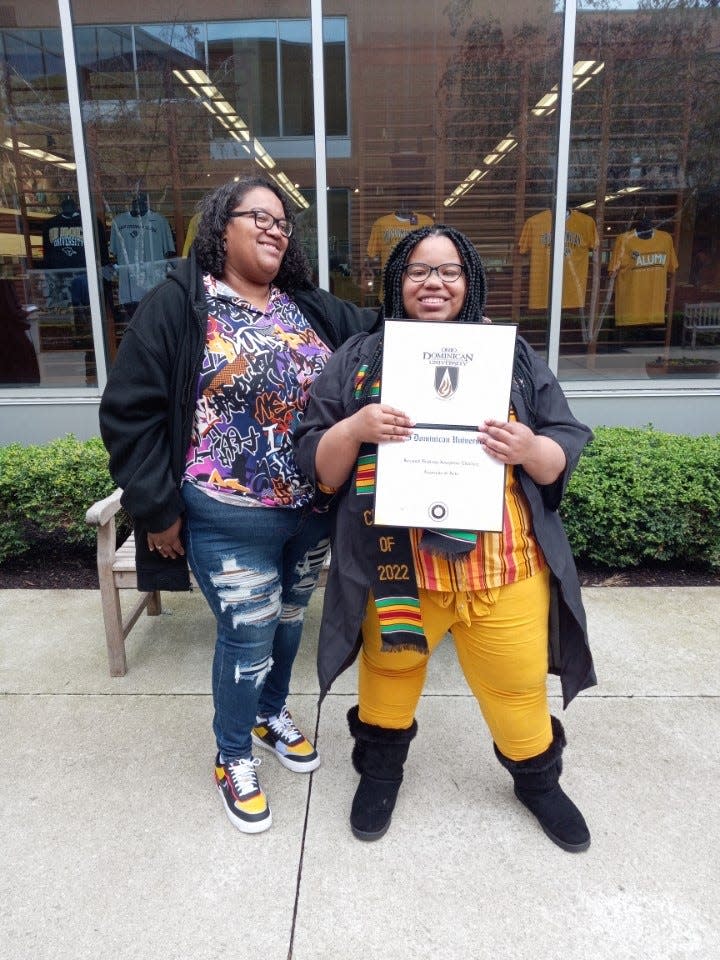Without expanded Child Tax Credit, South Side families find themselves struggling

Rainey Richardson remembers learning around the holidays that her family would no longer receive extra money from the government to stay afloat.
Her family was among thousands in Ohio that received monthly payments last year through the expanded Child Tax Credit. The support came as a relief at a difficult time: Richardson quit her job during the pandemic to help their children learn from home, so they relied only on her husband's income.
The family already qualified for the tax credit under its original parameters, but the temporary expansion approved by Congress increased the amount of money they could receive. The payments helped cover car insurance, groceries and clothing and shoes for their five children, although Richardson said they're still waiting on money owed to them for their youngest child.
"That was definitely a trying time for us financially, so it really helped us out a lot," Richardson, 36, said. "It didn’t help to solve the problem, but it helped us get some sleep at night."
Months after the expansion ended, families like Richardson's are contending with the high cost of groceries and gas without the extra safety net. And nonprofits on Columbus' South Side, where Richardson lives, can see the toll it's taking on parents and children who were already struggling.
Child Tax Credit expanded as part of COVID help
The Child Tax Credit dates back to the 1990s, but Congress temporarily expanded it last year as part of the American Rescue Plan. Under the expansion, eligible families received $3,600 for children younger than age 6 and $3,000 for those between 6 and 17. The program previously issued $2,000 per child.
Congress also made the credit fully refundable, which expanded eligibility because filers didn't need earnings to qualify for the full value. Families received monthly payments from January to December, and the remaining balance went on their 2021 tax returns.
The plan benefited an estimated 2.3 million children in Ohio, according to the Center on Budget and Policy Priorities. Proponents say the credit was instrumental in reducing child poverty rates.
"It had a tremendous benefit to our community," said Katelin Hansen, director of operations for the nonprofit Community Development for All People. "Folks that are just getting by suddenly had an opportunity to have a foothold, maintain and even get ahead in their situation."
Hansen said the additional money helped many families with rent, giving them a level of security they previously had not been afforded.
Now, people are starting to fall behind again. Thia Thissen, director of student and family services for the nonprofit SproutFive – formerly known as South Side Early Learning – said she saw an increased need for rental assistance when the expansion ended.
"It wasn't fun money," Thissen said.

Inflation battle makes unlikely any further expansion of Child Tax Credit
For Elizabeth Eberhart, the government money helped with a little bit of everything. Her children are older, but she has custody of three young grandchildren and became eligible for the credit because of them.
Finances are tight without the extra support, Eberhart said, and she can't work full time because she's out on disability. She's also feeling the effects of inflation: Buying ingredients for a spaghetti dinner at the grocery store costs twice what it used to.
"Things are constantly going up, and we’re at the same income," said Eberhart, 44, who lives on the South Side. "There’s no increase in wages. No increase in anything except for food prices, gas prices, rent, bills – the bare necessities that you need."
Sen. Sherrod Brown and other Democrats have pushed for a permanent expansion of the credit, but that's unlikely to happen in the current political climate. Economists say inflation can be attributed in part to COVID-19 relief funds distributed in 2020 and 2021, which overheated the economy as people had extra money to spend.
In a recent call with reporters, GOP Sen. Rob Portman said he wants to avoid more stimulus money such as the Child Tax Credit, calling it "one of the reasons that we are where we are."
Without the extra buffer for families, organizations on the South Side are doubling down on their work to connect people with affordable housing, food and other daily necessities. SproutFive recently stocked up on baby formula for parents who can't find it on grocery store shelves. Community Development for All People plans to build more affordable housing in the area.
But these organizations admit the work is easier when the federal government meets them in their efforts to help.
"It’s always so frustrating to see the headlines around the Child Tax Credit and see the amount of children that are now back in poverty because they are no longer receiving this benefit," said Jaclyn Dynia, SproutFive's senior director of innovation and research. "It just seems like such a logical fix that I don’t understand why anyone would oppose it."
This story is part of the Dispatch's Mobile Newsroom initiative. Visit our reporters at the Columbus Metropolitan Library's Parsons branch library and read their work at dispatch.com/mobilenewsroom, where you also can sign up for The Mobile Newsroom newsletter.
Haley BeMiller is a reporter for the USA TODAY Network Ohio Bureau, which serves the Columbus Dispatch, Cincinnati Enquirer, Akron Beacon Journal and 18 other affiliated news organizations across Ohio.
Get more political analysis by listening to the Ohio Politics Explained podcast
This article originally appeared on The Columbus Dispatch: Columbus families feel loss of expanded Child Tax Credit

